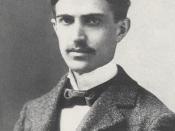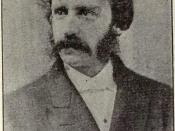Two Authors' Interpretations of Western Expansion During the mid-1800's, America's Western frontier was booming and drawing prospectors and adventurers from all parts of the world. Due to the West's rapid expansion, much of the truth was unclear to various parts of the world, thus causing the West to e a great mystery. Early stories depict different interpretations of the West. Two Western short stories, Stephen Crane's "The Blue Hotel," and Bret Harte's "The Outcasts of Poker Flat," portray the West in a convincing manner. Since both Crane and H te have similar views concerning Western expansion, their stories contain very similar elements such as; their descriptions of fate, natural obstacles, and death.
In both stories, fate is a key element with which the main characters struggle. John Oakhurst, a professional gambler in "The Outcasts of Poker Flat," has a strong belief in fate as though it were a religion.
John Oakhurst gives a compelling descript n of his interpretation of destiny: Luck, is a mighty queer thing. All you know about it for certain is that it's bound to change. And it's finding out when it's going to change that makes you. We've had a streak of bad luck since we left Poker Flat- you come along, and slap, you get into it, too. If you can hold your cards right along you're all right. (306) Similarly, in Stephen Crane's "The Blue Hotel," the character called the Swede, is an uptight tailor from New York. The Swede is a guest lodging at the Palace Hotel in Romper which is owned by Patrick Scully. The Swede is obsessed with the assumption at his fate has already been sealed and his death, guaranteed. The Swede fears the West and is under the assumption that all stereotypes concerning Western...

![English: w:Stephen Crane]].](https://s.writework.com/uploads/2/22855/english-w-stephen-crane-thumb.png)
